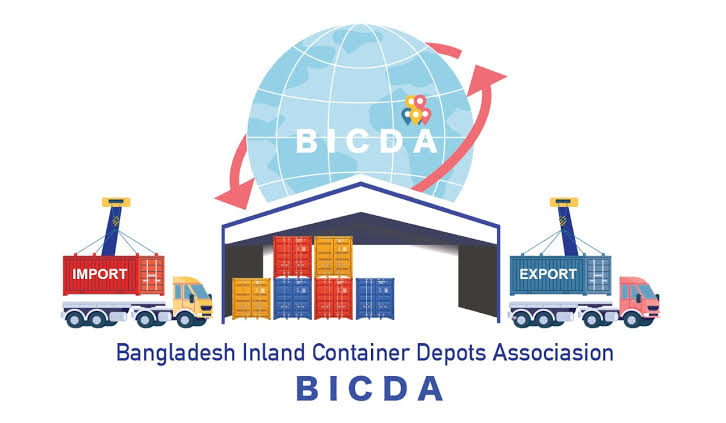12/18/2025

BICDA’s 63pc tariff hike deepens export concerns
Nur Uddin Alamgir | Published: 2025-07-22 20:55:12

A decision by the Bangladesh Inland Container Depots Association (BICDA) to raise outbound cargo and container handling tariffs by up to 63% has sparked serious concern among exporters, who warn that the move could further destabilise the already fragile export sector.
Industry stakeholders, particularly within the ready-made garment sector, argue that the tariff hike will increase logistics costs and undermine the country’s global competitiveness.
Describing the move as “unacceptable” and “alarming,” exporters have urged a review of the decision, which they say was taken without any consultation with stakeholders.
According to sources, 21 inland container depots (ICDs) – commonly referred to as off-docks – handle a significant share of the country's containerised exports and imports, including empty containers.
These ICDs manage approximately 93% of total export goods and 20% of containerised import goods, with a combined storage capacity of around 107,000 twenty-foot equivalent
units (TEUs).
In a circular issued on 15 July, BICDA informed its members of the new tariff structure, which will come into effect from 1 September, featuring increases of up to 63%.
BICDA Secretary General Ruhul Amin Sikder said the circular followed a decision by the executive committee, prompted by the need to achieve financial viability and full operational capacity.
He explained that the revised charges reflect rising operational and investment costs, increased labour expenses, higher equipment procurement and maintenance costs, depreciation of the taka against the US dollar, and growing bank interest rates.
“This is a framework of charges, and members can negotiate with the users, as the existing rate is not even standardised in the market,” he said.
“The increased charge will have an insignificant impact on each product, and we don’t believe it will affect export businesses either,” Sikder added.
However, SM Abu Tyub, President of the International Business Forum, Chattogram, claimed that BICDA has no authority to impose such a charge, noting that ICDs function as extensions of the port.
“They must consult with the port, which is responsible for addressing such issues. Increasing tariffs by 60–70% is simply unacceptable,” said Tyub, who also serves as a director of the Bangladesh Garment Manufacturers and Exporters Association (BGMEA).
He also raised questions about the level of service provided by the off-docks, saying the ICDs are now equipped to handle 65 types of goods, which should ideally reduce their operational costs.
“Hiking tariffs on export items effectively holds exporters hostage, especially when they are already grappling with multiple challenges, including the 35% reciprocal tariff recently imposed by the United States,” he added.
“This will erode our competitiveness in the global market, as buyers will be forced to bear higher logistics costs,” Tyub warned, adding that BGMEA will take appropriate action in response.
Former Vice President of the Bangladesh Freight Forwarders Association (BAFFA), Khairul Alam Suzan, echoed these concerns, stating that any tariff hike would impact both international buyers and local exporters.
“When buyers find that the cost of doing business is rising in Bangladesh, they will inevitably look for alternative sourcing destinations,” Suzan noted.
He pointed out that some major international buyers have already postponed orders following the announcement of the US reciprocal tariff, adding that an abrupt increase in ICD charges would only compound losses across the board.
When contacted, Chattogram Port Authority (CPA) Secretary Mohammad Omar Faruk said the matter rests with the ICDs and their users.
“There is no regulation that mandates port involvement in setting ICD tariffs. However, we sometimes mediate in times of crisis,” he explained.
New tariff structure announced by BICDA
As per BICDA’s revised schedule, the package charge for a 20-foot container has increased from Tk6,187 to Tk9,900, while the charge for a 40-foot container has risen from Tk8,250 to Tk13,200 – an increase of approximately 60%.
Ground rent for 20-foot containers has been raised from Tk115 to Tk150, and for 40-foot containers from Tk230 to Tk300 – an increase of 30.43%.
The landing charge has gone up from Tk207 per tonne to Tk270, and the CFS (Container Freight Station) storage charge from Tk29 to Tk45 – up by 30.43% and 55.17%, respectively.
Reefer plug-in charges have increased from Tk1,700 to Tk2,200. Charges for garments on hanger (GoH) cargo have been newly fixed at Tk11,900 for 20-foot containers, Tk15,200 for 40-foot, and Tk16,900 for HC and 45-foot containers.
Ground rent for empty containers has risen by 30.43% across all categories, while lift-on/lift-off charges have gone up by 46.48%.
Documentation charges have surged by 63.04%, from Tk276 to Tk450.
Additionally, haulage (transportation) charges have been raised from Tk1,705 to Tk2,500 for 20-foot containers, and from Tk3,410 to Tk5,000 for 40-foot containers – an increase of 46.62%.
Editor & Publisher : Md. Motiur Rahman
Pritam-Zaman Tower, Level 03, Suite No: 401/A, 37/2 Bir Protik Gazi Dastagir Road, Purana Palton, Dhaka-1000
Cell : (+88) 01706 666 716, (+88) 01711 145 898, Phone: +88 02-41051180-81